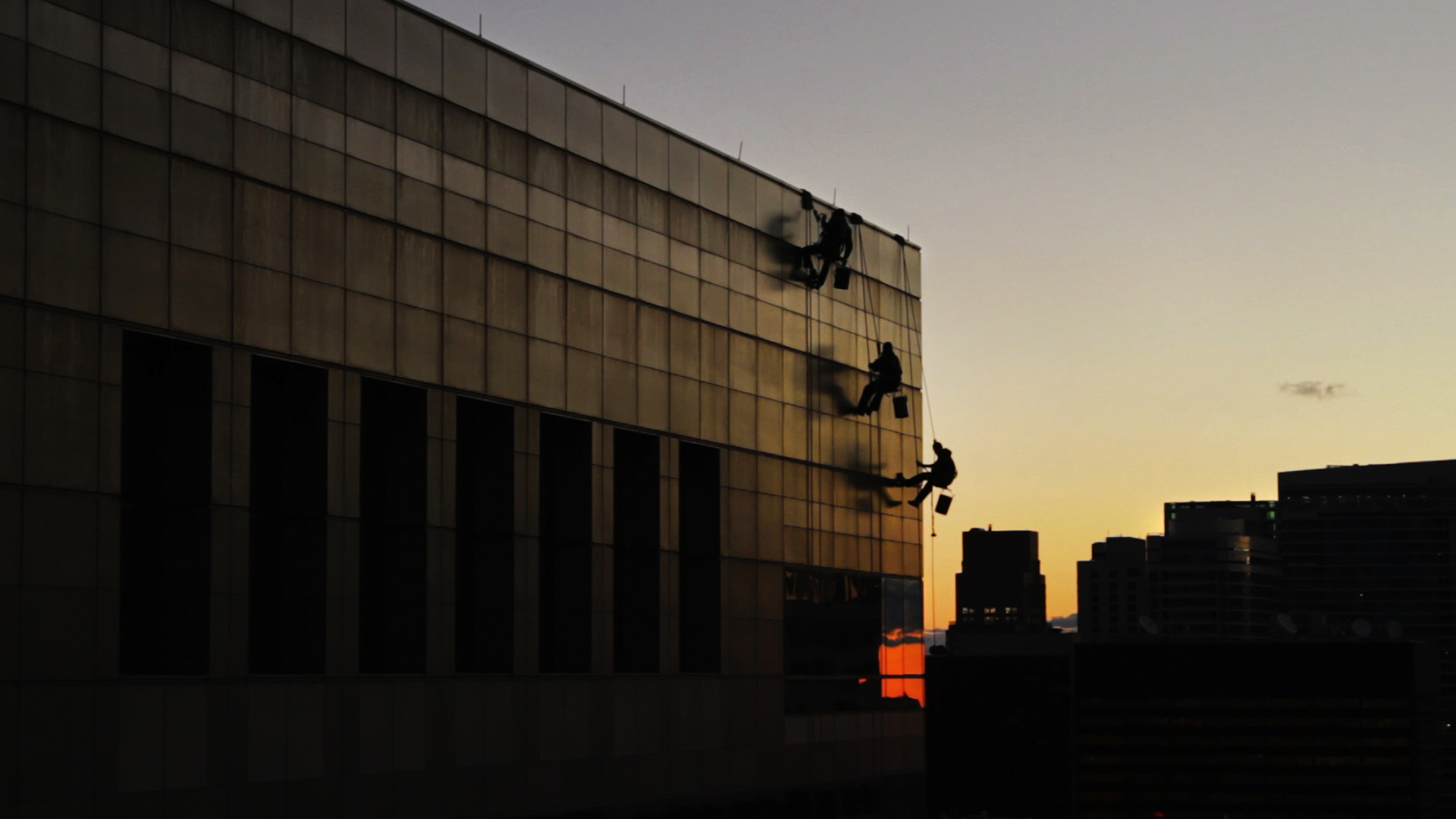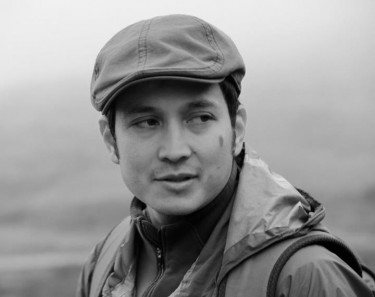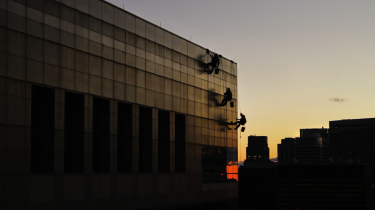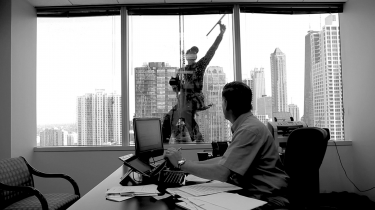 Back to selection
Back to selection
“PARAíSO”: AN INTERVIEW WITH NADAV KURTZ

On still mornings in the “Windy City,” a select few people can be seen careening down the high rises that mark Chicago’s skyline. While the buildings they descend contain people waking up for their daily routines—or the destinations of such routines—these men are living out their routines. In the short documentary Paraíso (Paradise), newcomer Nadav Kurtz delves into the lives of three Mexican immigrants working as window washers in Chicago. The film, which won Best Documentary Short awards at this year’s Tribeca International Film Festival and the Seattle International Film Festival, portrays a segment of the workforce for Chicago’s largest union window washing company. Around 80% of this company’s workers hail from the small Mexican town of Garcia de la Cadena, where notions of American ascension are plainly literal.
Over Paraíso‘s ten minutes, Kurtz has the window washers (two brothers and a cousin) open up about the risks they take in order to support their families back home. As the three set up forty floors high and tie the knots their lives depend on, their temperaments are hardly those of thrill-seekers—even though that’s what the bureaucrats inside their buildings may think about them. Nor do the men visibly shake in their boots. As we hear in voiceover, they are each totally resigned to what they do, and only fear death inasmuch as it will affect their relatives. Much of Paraíso takes place atop the concrete canopy of Chicago’s downtown. Kurtz treats us to beautiful images of the men considering their horizons beyond and below. While remaining interested in their work as work, Kurtz pursues the subject more as a means of exploring the complex race dynamics of Chicago, immigration in the U.S., and the parallel lives people lead as they arrive from different circumstances.
I first saw Paraíso at this year’s Tribeca Film Festival in a shorts program I attended for no other reason than I had to fill time between screenings. As it turned out, the film struck me as one of the strongest docs of the entire festival. By virtue of its awards, festival juries would have to agree. Viewers have the opportunity to catch Paraíso at Silverdocs on June 21st (12 PM) and June 22nd (2:45 PM), and at the LA Film Festival on June 21st (9:50 PM) and June 23rd (1:30 PM). Filmmaker sat down with Nadav Kurtz during the Tribeca Film Festival to discuss his experience making the film and working in the short film format.

Filmmaker: So this is your first interview of the festival?
Kurtz: This is actually my first interview ever.
Filmmaker: Well, as a documentary filmmaker you’ve already got the odds stacked against you. As a short documentary filmmaker, I imagine it’s that much harder for you to get visibility. Which I think is a good starting point. Who are you?
Kurtz: (Laughs) I lived in Chicago for about 12 years. When I was making Paraíso, I lived in the Bay Area. And I moved to Brooklyn the first day of the Tribeca Film Festival. I worked as an editor for a long time on commercials, and cut two features as well. But that doesn’t really summarize it, because I’m interested in a lot of other things. My interests were always broader than what I was doing.
Filmmaker: Did you go to film school?
Kurtz: No, I studied literature at the University of Chicago. A long, long time ago I thought I wanted to be a writer. So most of my experience comes from the workplace.
Filmmaker: How did you make the move from wanting to be a writer to a film director?
Kurtz: When I was editing, I was always trying to do more than what an editor does—trying to get involved in rewrites, really intense sound design, etc. It always felt too constricting to just edit. So I had been helping other people get their stories across—I cut another film called Street Thief that was at Tribeca in 2006—and I just realized that I really wanted to make films. So a couple years ago, I made this commitment to myself to direct. And there were a few different ideas, and this was the one that seemed the most promising.
Filmmaker: Let’s talk about that idea. It’s definitely an evocative image—people scaling down skyscrapers on a daily basis in total anonymity. What was the point of inspiration for you?
Kurtz: Initially I thought of the film as being a sort of edgy look-at-these-crazy-guys-who-do-this-crazy-job thing. “Who are these dare devils?” you know? I was in Chicago working on a job, and I started taking stills of these window washers. And eventually I started talking to them, and a lot of them gave me leads. There was this Romanian guy I heard about who was a poet and a philosopher and a window washer. And I thought I was going to be able to find “interesting” characters like that—interesting in the most clichéd way, I guess. But as I continued working on it, it actually became very influenced by Zen Buddhism.
 Filmmaker: That’s quite a transition.
Filmmaker: That’s quite a transition.
Kurtz: I’m a Zen Buddhist meditator myself, and one of the things you see when you go into the zen centers is a han—it’s a big wooden board that you hit as a call to meditation. And one han I saw had this quote on it that said, “Great is the matter of birth and death. Don’t waste your life.” And this was something I was thinking about as a filmmaker. I was like, “Okay, I’m not doing what I want to do. What I want to do is direct. Life is passing and I want to make a film.” That was my personal part, but the part I started think about with these guys was, they are in contact with this “matter of birth and death” every day, every time they go over the edge.
Filmmaker: I would think that fatality would occur to anyone working in that profession. However, maybe not. Maybe the people who work these jobs have to be desensitized to death in order to do it. Did you find that fear of death was very close to the surface for these men?
Kurtz: That was definitely something I had to get them to talk about. The clue was when I asked if they ever dreamed about their work. And one of them said that he had this experience—at one point this was happening to him a few times a week—where he would fall asleep and wake up feeling like he was falling. So for me that suggested that there was something underneath. As we got into this process of doing interviews, they started to think more about their relationship to the danger of their work. And that became something that they started to expand on amongst themselves. But they come from a culture where you don’t necessarily talk about your inner feelings.
Filmmaker: Well, it seems like they don’t have the luxury of talking about their inner feelings. Their primary concern seems to be supporting themselves and their families back home. I understand they all come from Mexico?
Kurtz: Yeah, interestingly about 80% of the people who work for that company in Chicago come from this one small town in Mexico called Garcia de la Cadena. There was an article a few years ago about it in the Chicago Tribune. Their uncles came over and started to work for this company. And then their cousins came. It’s kind of a family thing now where they all come from this one small town in Mexico to do this work.
Filmmaker: There’s a definite amount of craft involved in what they do. How did they learn? Was it handed down?
 Kurtz: One of the parts I ended up cutting that I missed most was this whole story about how there’s a family secret to tying in. There’s a whole craft involved in doing it quickly, doing it safely. And they’re very protective of that. They told me about a time when the owner of their company said to them, “Hey, why don’t you show all these rookies who are not part of your family how to tie in quickly and do your job?” And they said, “A chef wouldn’t show the dishwasher how to cook the food, because if they did they wouldn’t be needed anymore.” So the subjects of the film are very tight knit. They have a guarded family secret to how you tie in.
Kurtz: One of the parts I ended up cutting that I missed most was this whole story about how there’s a family secret to tying in. There’s a whole craft involved in doing it quickly, doing it safely. And they’re very protective of that. They told me about a time when the owner of their company said to them, “Hey, why don’t you show all these rookies who are not part of your family how to tie in quickly and do your job?” And they said, “A chef wouldn’t show the dishwasher how to cook the food, because if they did they wouldn’t be needed anymore.” So the subjects of the film are very tight knit. They have a guarded family secret to how you tie in.
Filmmaker: I can understand that they’re protecting their jobs, but doesn’t their refusal to teach newcomers leave those people vulnerable to disaster?
Kurtz: No, in general everyone is very careful about how they tie in, especially the union guys. I think it’s more a matter of speed. Because they get paid piecemeal. So if they do the building in three days or a week, they get paid the same. There’s always a good way to tie in, but it may take you longer to do it, which means you earn less.
Filmmaker: There’s something metaphorical about immigrants repelling down a skyscraper as a profession. Their jobs perfectly reflect how much some people risk for the ideal of American prosperity.
Kurtz: I love the idea that there’s glass separating them from the people inside their offices. They’re on the outside looking in and there’s this visual contact. For me that glass was a potent metaphor for the city’s race and class divisions. And the other metaphor concerns mortality. I really feel that the film’s universality comes from the idea that we’re all encountering our mortality everyday, we’re just not always conscious of it. Most of us walk out on the street without considering that this, for whatever reason, could be the last day of our lives. We don’t really pay attention to our lives in the way that we would if that were the case. For me, the window washers’ experience of their lives is heightened because they are in contact with that reality everyday. And part of what I was hoping to convey was the preciousness of life that they embody. We can watch them and think that this is true for us as well, if not on a conscious level then at least on an emotional level.
Filmmaker: A lot of filmmakers treat shorts as a way to test an idea or maybe secure funding for a larger project. But for you, it seems like you conceived this project as a short. Why did you think this story lent itself to a short rather than a feature?
Kurtz: I think that the metaphors in the film would be diluted in a longer piece. And I wasn’t interested in making a film about the nitty gritty—how do they do their job, how much money to they make. I thought that all of those practical concerns took away from the larger themes I was trying to convey. I think a lot of people think have different boxes for different things. They have different categories for documentaries and narratives, shorts and features. And those are natural categories to have. But for me, it’s all just pictures and sounds. So it’s almost like a sculptor. People describe a sculptor as being able to see the thing that’s inside the stone before they start chiseling it. And I don’t think that artists necessarily get to choose what their work is going to be from the beginning. They kind of see it and find out what it wants to be, and they stay as true to that as possible. That’s at least my attitude when I make things. This just felt like what the film wanted to be.
